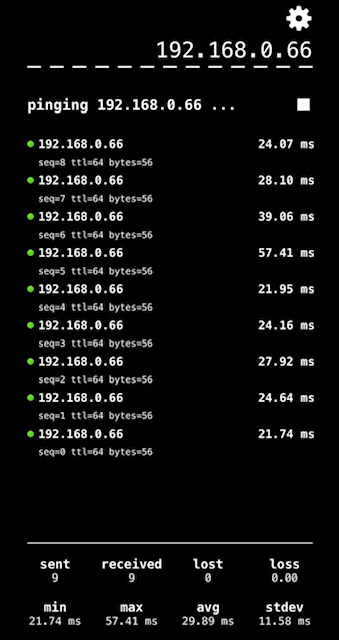Writing a "bare metal" operating system for Raspberry Pi 4 (Part 15)
====================================================================
Adding a TCP/IP stack
---------------------
Having achieved "proof of life" from our Ethernet module in _part14-spi-ethernet_, you're doubtless wondering how to go from there to serving web pages, posting tweets on Twitter or perhaps even just simply responding to a ping!
This is where you'll need a fully-fledged TCP/IP stack that goes way beyond handcrafted ARPs, implementing many more protocols to achieve efficient bi-directional communication.
In this part we make use of some code from Guido Socher of [tuxgraphics.org](http://tuxgraphics.org/), designed to be a lightweight TCP/IP stack for embedded devices. I chose this because it was super simple to get working (or "port"), but you might want to look at [LwIP](https://en.wikipedia.org/wiki/LwIP) if you need something more advanced.
The code
--------
Most of the new code is in the _tcpip/_ subdirectory. I actually came across it in [this tarball](http://tuxgraphics.org/common/src2/article09051/eth_tcp_client_server-dhcp-5.10.tar.gz) and, again, made only a very few cosmetic changes (`diff` is your friend!).
It did require me to expose the `strlen()` function we implemented in _lib/fb.c_, so that's added to _include/fb.h_. Similarly, we expose the `memcpy()` function we implemented in _kernel/kernel.c_, so that's added to _kernel/kernel.h_.
I also needed a single function that tells the ENC to send a packet. Nothing new here, just different packaging:
```c
void enc28j60PacketSend(unsigned short buflen, void *buffer) {
if (ENC_RestoreTXBuffer(&handle, buflen) == 0) {
ENC_WriteBuffer((unsigned char *) buffer, buflen);
handle.transmitLength = buflen;
ENC_Transmit(&handle);
}
}
```
This was also added to _kernel/kernel.h_.
What happened to _arp.c_?
-------------------------
You'll notice that I've merged _arp.c_ and _kernel.c_. We still initialise the network card in exactly the same way but, when we're done, we call this function in Guido's code:
```c
init_udp_or_www_server(myMAC, deviceIP);
```
This tells the TCP/IP library who we are, so we're all on the same page!
Finally, and aside from a little cleanup (eg. moving the HAL timer functions to _io.c_ with the commensurate changes to _io.h_), the major change is the new `serve()` function:
```c
void serve(void)
{
while (1) {
while (!ENC_GetReceivedFrame(&handle));
uint8_t *buf = (uint8_t *)handle.RxFrameInfos.buffer;
uint16_t len = handle.RxFrameInfos.length;
uint16_t dat_p = packetloop_arp_icmp_tcp(buf, len);
if (dat_p != 0) {
debugstr("Incoming web request... ");
if (strncmp("GET ", (char *)&(buf[dat_p]), 4) != 0) {
debugstr("not GET");
dat_p = fill_tcp_data(buf, 0, "HTTP/1.0 401 Unauthorized\r\nContent-Type: text/html\r\n\r\nERROR
");
} else {
if (strncmp("/ ", (char *)&(buf[dat_p+4]), 2) == 0) {
// just one web page in the "root directory" of the web server
debugstr("GET root");
dat_p = fill_tcp_data(buf, 0, "HTTP/1.0 200 OK\r\nContent-Type: text/html\r\n\r\nHello world!
");
} else {
// just one web page not in the "root directory" of the web server
debugstr("GET not root");
dat_p = fill_tcp_data(buf, 0, "HTTP/1.0 200 OK\r\nContent-Type: text/html\r\n\r\nGoodbye cruel world.
");
}
}
www_server_reply(buf, dat_p); // send web page data
debugcrlf();
}
}
}
```
This is an infinite loop which waits for an incoming packet and then firstly passes it to Guido's `packetloop_arp_icmp_tcp()` function. This function implements some useful things, like responding to pings. I modified the routine to print a message to the screen when it sends a "pong" (look from line 1371 of _tcpip/ip_arp_udp_tcp.c_), so we can see when it's in action!
Examining the return value of `packetloop_arp_icmp_tcp()` then allows us to check whether there is an incoming web request, since we've configured the TCP/IP library to be a web server in _tcpip/ip_config.h_ with `#define WWW_server`.
We then serve responses based on three possible cases:
* The incoming request is not a GET request (eg. maybe it's a HEAD request) - you can simulate this using the `curl` tool: `curl -I 192.168.0.66`
* The incoming request is a GET request for the root web page `/` - `curl 192.168.0.66/`
* The incoming request is a GET request for any non-root web page - eg. `curl 192.168.0.66/isometimes/monkey`
I recommend reading [this page](http://tuxgraphics.org/electronics/200905/embedded-tcp-ip-stack.shtml) for a full explanation. The code I have ported is very similar to what you see there.
_Imagine my excitement when I built, ran and could ping my RPi4 at 192.168.0.66 and get a web response to my browser on both my laptop and my iPhone!_

